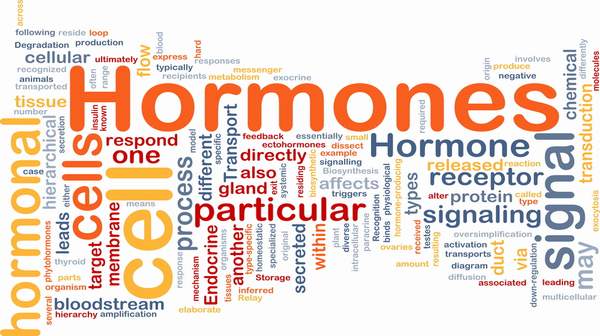Hormones are your body’s chemical messengers. They travel in your bloodstream to tissues or organs. They work slowly, over time, and affect many different processes, including
- Growth and development
- Metabolism – how your body gets energy from the foods you eat
- Sexual function
- Reproduction
- Mood
Endocrine glands, which are special groups of cells, make hormones. The major endocrine glands are the pituitary, pineal, thymus, thyroid, adrenal glands, and pancreas. In addition, men produce hormones in their testes and women produce them in their ovaries.
Hormones are powerful. It takes only a tiny amount to cause big changes in cells or even your whole body. That is why too much or too little of a certain hormone can be serious. Laboratory tests can measure the hormone levels in your blood, urine, or saliva. Your health care provider may perform these tests if you have symptoms of a hormone disorder. Home pregnancy tests are similar they test for pregnancy hormones in your urine.
Major Types of Hormones
What do hormones do, exactly? The body has many different hormones, but certain types have a bigger role to play in the body’s health and well-being. Understanding these roles is important for those looking to protect and manage their health.
For women, estrogen (or estradiol) is the main sex hormone. It causes puberty, prepares the body and uterus for pregnancy, and regulates the menstrual cycle. During menopause, estrogen level changes cause many of the uncomfortable symptoms women experience.
Progesterone is similar to estrogen but is not considered the main sex hormone. Like estrogen, it assists with the menstrual cycle and plays a role in pregnancy.
Cortisol has been called the “stress hormone” because of the way it assists the body in responding to stress. This is just one of several functions of this important hormone.
Melatonin levels change throughout the day, increasing after dark to trigger the responses that cause sleep.
Testosterone is the main sex hormone in men. It causes puberty, increases bone density, triggers facial hair growth, and causes muscle mass growth and strength.
When they are in proper balance, hormones help the body thrive, but small problems with hormones can cause serious and life-altering symptoms. If you have concerns about any of your hormones, talk to a qualified endocrinologist.
Hormones and diseases
Hormone disorders are diagnosed in the laboratory as well as by clinical appearance and features. Laboratory tests can be used to test bodily fluids such as the blood, urine or saliva for hormone abnormalities.
In the case of hormone deficiency, a synthetic hormone replacement therapy may be used and in cases of excess hormone production, medications may be used to curb the effects of the hormone. For example, a person with an underactive thyroid gland or hypothyroidism may be treated with synthetic thyroxine which can be taken in the form of a pill, while a person with an overactive thyroid may be administered a drug such as propranolol to counteract the effects of the excess thyroid hormone.





